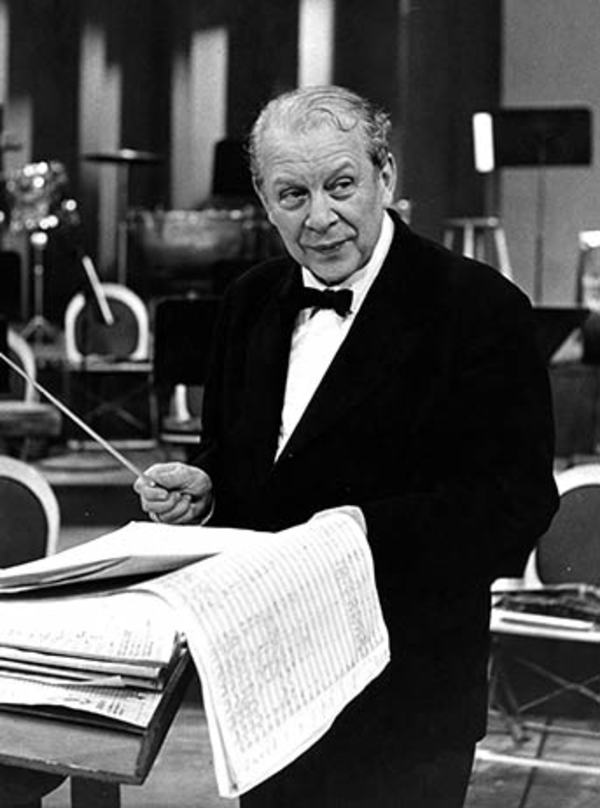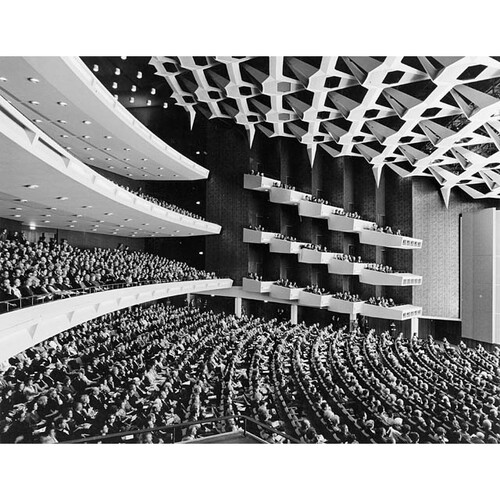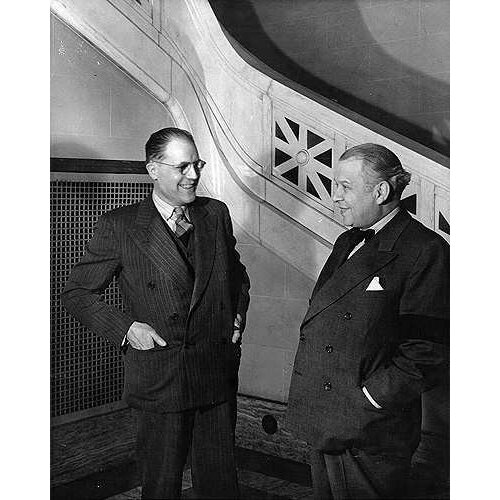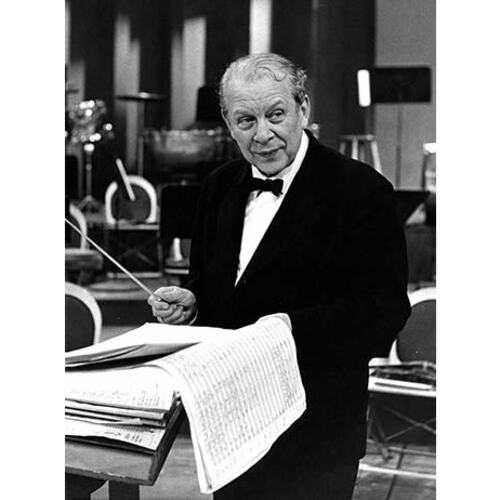
Source: Link
PELLETIER, WILFRID (baptized Joseph-Louis-Wilfrid, also known, especially in the United States, by the first name of Wilfred), pianist, conductor, administrator, and civil servant; b. 20 June 1896 in the parish of Sacré-Cœur-de-Jésus, Montreal, son of Elzéar Pelletier and Zélire Sévigny; m. first 21 Feb. 1916 Berthe Jeannotte (d. probably 1945) in the parish of Saint-Léon-Premier, Westmount, Que., and they had two sons; m. secondly 23 Nov. 1925 Queena Tillotson, an opera singer known by the pseudonym of Queena Mario (d. 28 May 1951), in Winnetka, Ill.; they divorced on 12 Aug. 1936; m. thirdly 24 May 1937 Rose Bampton, an opera singer (d. 21 Aug. 2007), in Elkton, Md; d. 9 April 1982 in New York and was buried in the cemetery of St David’s Episcopal Church in Wayne, Pa.
Wilfrid Pelletier was born three days before the federal election that brought the Liberal Party to power. His father would have liked him to be baptized Wilfrid-Laurier, but his mother yielded only on the first name of the head of the future government. A baker by trade, Elzéar played with some of his brothers and friends in an amateur brass ensemble they had formed. Wanting this modest group to take part in his temperance campaign, Oblate father Joseph-Octave Pelletier, another of Elzéar’s brothers, invited the family to settle in the parish of Saint-Pierre in Montreal around 1900. Little Wilfrid played a few simple percussion instruments in the Corps Musical de Tempérance de Montréal [see Joseph-Jean Goulet*], of which he was also the mascot.
In 1904 Pelletier met his first music teacher, Ida Campbell, the wife of Belgian clarinettist François Héraly. Having noticed the child’s interest in the piano, Mme Héraly suggested to his parents that she give him lessons; she would do so until 1914. Wilfrid was only 11 years old when, on 18 May 1908, he took part in his first public concert during a festival in Sohmer Park [see Ernest Lavigne*]. He and another pupil of hers performed a piano transcription for four hands of the overture to Zampa by Ferdinand Hérold. The following day a critic for the daily La Presse reported that they distinguished themselves by their “brio.” Two days later Pelletier performed Beethoven’s Piano sonata no.14, known as the “Moonlight” sonata, during the benefit concert for tenor Abel Godin.
Unable to compete with the new industrial bakeries, Elzéar had to close his shop and make do with low-paying work. Around 1908 Wilfrid left the elementary school in the parish of Saint-Pierre to increase the family income. He held down a few jobs creating sound effects and playing percussion and piano at the Windsor Star cinema, the Victoria Skating Rink, the Théâtre National Français, and Dominion Park. At His Majesty’s Theatre he discovered the splendours of the lyric stage while attending a performance of Mignon by Ambroise Thomas in 1910. His mind was made up: he would make a career in opera. During the 1912–13 season he obtained the position of rehearsal pianist at the Montreal Opera Company, founded and directed by Albert Clerk-Jeannotte, his future brother-in-law.
Following a concert given by Mme Héraly’s pupils, a journalist from Le Devoir noted of Pelletier on 22 April 1911 that if a patron “could take care of this young artist’s future, we should without a doubt later be able to include among us a new musical star.” In 1912 Pelletier entered the competition for the second Prix d’Europe, which was administered by the Académie de Musique de Québec. Despite serious practice with music teachers Alexis Contant* and Alfred Laliberté, Pelletier, who had been compelled to drop out of school, failed the examination questions on literature and history, received disastrous results in solfège, and lost to Léo-Pol Morin*, who was much better trained. Pelletier did not give up but worked for three years with Father Étienne Galtier and the musician Théo Henrion to fill the gaps in his knowledge; they prepared him so well that he won the scholarship in 1915.
World War I delayed until the autumn of 1916 Pelletier’s departure for Paris with the woman whom he had married the previous winter. There he studied piano with Isidor Philipp, the operatic repertoire with Camille Bellaigue, harmony and composition with Marcel Samuel-Rousseau, and piano and organ with Charles-Marie Widor. However, the increasing pressure of bombing raids and rationing forced the young couple to return to North America on 4 July 1917, before the scholarship had expired. On 25 August Montreal’s Le Passe-Temps announced that Wilfrid and his brother-in-law Clerk-Jeannotte had decided to settle in New York: “Yet another two … who are finding more encouragement among our neighbours than in their own country.” Indeed, Montreal offered very few prospects at the time: the Montreal Opera Company had closed its doors in 1913, and the Orchestre Symphonique de Montréal, reorganized by Joseph-Jean Goulet, gave fewer and fewer concerts and would fold in 1919. Since his scholarship could not be transferred to the United States, Pelletier looked urgently for work, the more so because his first son had been born in Paris. A New York agency directed him to the Swedish soprano Marie Sundelius. He passed his audition and accompanied the singer at the piano during a performance with the New York Philharmonic Orchestra, at which he met Pierre Monteux, conductor of the orchestra of the Metropolitan Opera. Monteux helped him get a small contract for private rehearsals and introduced him to the general manager of the Met, Giulio Gatti-Casazza, who hired him on 17 Aug. 1917 as rehearsal pianist for French repertoire, associate conductor, piano accompanist, and assistant to the stage manager. Pelletier appeared as pianist and accompanist at the Met for the first time on 16 December. La Presse spread the news of his promotion on 9 Feb. 1918: “The career of this young French Canadian artist has been as fast moving as [it has been] fortunate, because at 21 years of age he is realizing the dream cherished by so many musicians of all nationalities: joining the Metropolitan.”
In 1919 the baritone Antonio Scotti founded in the United States the Scotti Grand Opera Company, which went on North American tours. Pelletier came to Montreal with the company in 1919, 1920, and 1921 as assistant to the conductors Gennaro Papi and Carlo Peroni. Papi boosted Pelletier’s career as a conductor by asking him to conduct Verdi’s opera Il trovatore on 21 May 1920 in Memphis, Tenn. Two years later, again thanks to Papi, Pelletier was the stage manager during the summer opera season at Ravinia Park in Chicago. He would leave these obscure duties to conduct 13 opera performances between 1924 and 1931.
At the Met, Pelletier’s career entered another phase on 19 Feb. 1922 when he conducted his first Sunday evening concert. He took charge of these weekly performances in 1924. From the following season, the post of organist was added to his responsibilities. In 1928 Pelletier led his debut operas with the Met as assistant conductor, first on 24 January in Philadelphia and then on 14 April at the Metropolitan Opera House in New York. He had directed only five operas as assistant conductor by 1935, devoting most of his time to organizing his Sunday concerts. Despite the increasing number of his engagements in New York and elsewhere in the United States, he returned to Montreal to lead a few concerts between 1926 and 1933.
In May 1935 the Canadian-born tenor Edward Johnson* became managing director of the Met. He immediately put Pelletier in charge of French repertoire and promoted him from assistant conductor to conductor. In December Pelletier set up Metropolitan Opera auditions of the air, a half-hour weekly radio broadcast that aimed to recruit young voices for the company. The initiative gradually ensured a supply of talented singers, a success that proved particularly important when World War II prevented European artists from performing in North America. The program, which would come to an end in 1958, advanced the careers of an incredible number of American vocalists, among them Leonard Warren and Risë Stevens, not to mention those of Pelletier’s compatriots Pierrette Alarie, Denis Harbour, Raoul Jobin*, Louis Quilico*, and Teresa Stratas. In 1939–40 Pelletier officially signed his first contract with the Met as conductor; it was from this moment on that he was most active as an opera conductor.
Since 1930 the Montreal Orchestra had been offering symphony concert series. Under the direction of Douglas Clarke*, dean of the faculty of music at McGill University, the orchestra showed few signs of being open to French Canadian artists and conductors. In the autumn of 1934 representatives of the francophone elite, including the mla for Terrebonne and Provincial Secretary Louis-Athanase David* and his wife Antonia Nantel, decided to establish the Société des Concerts Symphoniques de Montréal, aimed at the French Canadian public and its artists. On 13 November David offered the directorship to Pelletier; the invitation was of little interest to the conductor, whose American career was in full swing. Yet Elzéar reminded his son that, without the Prix d’Europe, the Met would have been beyond his reach and that it was time to repay the debt he owed his country. A simple adviser in 1934, Pelletier accepted the post of artistic director of the SCSM the following year on the express condition that matinee introductory symphony concerts for young people be established; this agreement was reached on 16 Nov. 1935. Additionally, in 1936 he collaborated with Antonia Nantel and the SCSM to offer summer music seasons, which would end only in 1965 (they would take the name Montreal Festivals on 2 Aug. 1939). Again with the support of the SCSM, he inaugurated on 1 July 1938 the summer concerts at the Chalet du Mont-Royal. At the end of the 1940–41 season the future of the SCSM seemed assured; at the same time, the Montreal Orchestra ceased its activities. But an internal conflict over the selection of artists and his schedule pitted Pelletier against the SCSM management. The artistic director resigned his post. Peace was nevertheless re-established between the two parties and, starting in 1944, Pelletier returned to the podium for a few performances. In 1948 he resumed hosting the symphonic matinees, a duty he had given in 1942 to the Belgian conductor Désiré Defauw, his successor at the SCSM. He had not, however, ceased to appear at the Montreal Festivals and at the summer concerts.
Meanwhile, the debate about higher musical education in Quebec, begun in 1937 when Maurice Le Noblet Duplessis* was premier, had resurfaced. During the administration of Adélard Godbout*, Hector Perrier*, the devoted provincial secretary and mla for Terrebonne, introduced a bill that gave rise on 29 May 1942 to the Act to establish the Institute of Music and Dramatic Art of the Province of Quebec. Perrier knew Pelletier well since they had attended school in Saint-Pierre at the same time and had stayed in touch. The encouragement of music was one of the subjects they discussed, and the conductor’s opinion no doubt influenced the politician. On 22 October Perrier appointed Pelletier managing director of the new institution. Aside from considerations of friendship, Perrier took into account Pelletier’s strong reputation, his competence, and his sense of organization. In his duties, Pelletier used the best European conservatories as his model, particularly the one in Paris. Students were admitted by competitive examination and followed a demanding program that culminated in a diploma after five years of study. Pelletier recruited eminent professors, not only in Quebec and elsewhere in Canada, but also in Europe and the United States.
In 1950 the winds of change were blowing at the Met when Rudolf Bing, the British impresario of Austrian extraction, replaced Johnson. The new managing director, who wanted to give less emphasis to the French repertoire in order to offer more German operas, did not renew the contracts of four conductors, including that of Pelletier, who nevertheless retained the Metropolitan Opera auditions of the air series. Between 1922 and 1950 Pelletier had conducted 247 performances of 20 operas, of which 192 had been devoted to the French repertoire (notably Gounod’s Faust, Bizet’s Carmen, Thomas’s Mignon, and Massenet’s Manon), and 26 had been broadcast. He had mounted the podium 214 other times to present under his baton eight ballets as well as gala evenings and, above all, the Sunday concerts that he had coordinated for 20 years. He made his last appearance with the Met on 15 May 1950 in Rochester, N.Y., where he conducted Faust. He would continue to work and reside in the American metropolis until the end of his life. There he also spent time with friend and adviser Arturo Toscanini, the famous conductor.
Pelletier’s new circumstances allowed him to focus his career more on Quebec. The Orchestre Symphonique de Québec [see Joseph Vézina*] was the first to benefit. Since 1947 Pelletier had acted as a guest conductor of the ensemble for a few concerts, and in 1951 it chose him as the fourth musical director in its history. His initial concern was to put an end to a certain amateurism and give the orchestra a professional character. With the aid of his assistant Françoys Bernier, he recruited better-trained musicians and helped renew the repertoire by including more contemporary music. He also presented matinee symphony concerts for young people. When he tendered his resignation in the spring of 1966, Pelletier left a permanent, reinvigorated ensemble, on a par with the best Canadian orchestras.
Between 1954 and 1970 Pelletier was given a few television programs on Radio-Canada, the French-language network of the Canadian Broadcasting Corporation. The conductor sometimes hosted Concerts pour la jeunesse, the televised version of the matinee symphony concerts. L’Heure du concert aired television broadcasts of several operas that he conducted. Thanks to Wilfrid Pelletier rencontre, he brought a new crop of talent to the public’s attention from 1965 to 1967.
Pelletier still held the post of managing director of the province’s Institute of Music and Dramatic Art when, in 1961, trouble set in. Some people nicknamed him “the invisible man” because he was constantly travelling between Montreal, Quebec City, and New York. Guy Frégault*, Quebec’s first deputy minister of cultural affairs, observed the conflict from close up: “His career wins him many admirers and arouses much envy. There is a tough campaign being waged against him.” In August Pelletier was replaced without fanfare by the conductor Roland Leduc*. He left an institute that had trained excellent music teachers and performers of international calibre.
Pelletier’s expertise was fortunately picked up by the minister Georges-Émile Lapalme, who on 25 Aug. 1961 appointed him director of music instruction for the province of Quebec, an office that had been set up in the wake of the formation of the Department of Cultural Affairs. One of his first tasks was to prepare a report for the royal commission of inquiry on education, 1961–66, also known as the Parent commission [see Alphonse-Marie Parent*]. In his “Mémoire à la commission royale d’enquête sur l’enseignement, traitant plus particulièrement de l’enseignement de la musique,” submitted in Quebec City in 1962, he made a series of recommendations. A few of them would be implemented at some point, notably the creation of an opera house and the setting up of programs that combined studies and music. His awareness raised by Jean Papineau-Couture* and Jean Vallerand*, Pelletier also advocated establishing a group to promote contemporary music. He served as intermediary between its founders and the Department of Cultural Affairs to help the group obtain a grant; with this boost, the Société de Musique Contemporaine du Québec emerged in 1966. He gave up his duties in 1968.
Nature eventually caught up with this indefatigable man, who suffered two heart attacks, in 1964 and 1967. Pelletier experienced the added grief of losing his son François on 2 April 1972. Nevertheless, he continued to take an interest in the musical life of Quebec and especially in the problem of opera in Montreal, which had preoccupied him for a long time. Indeed, between 1931 and 1945 he had presented short opera seasons in Montreal and other Canadian cities. He conducted the much-awaited Canadian premiere of Pelléas et Mélisande by Debussy during the Montreal Festivals in 1940. He would have preferred, however, the establishment of a permanent lyric theatre that would provide a full yearly season instead of a series of sporadic performances. In the 1960s he found an ally in Jean Drapeau*, the mayor of Montreal, yet the cause made little progress. The provincial government finally established the Opéra du Québec in 1971, but financial difficulties precipitated its end in 1975. Pelletier’s dream, so close to being realized, faded. His final appearance as conductor took place under moving circumstances on 30 Aug. 1978 in the city of his birth, during an operatic concert organized by the Mouvement d’Action pour l’Art Lyrique du Québec, when singers and musicians paid him tribute. Two people helped Pelletier to the podium, from which he invited not only the singers, but also the audience, to sing the slaves’ chorus from Verdi’s opera Nabucco.
In the course of his career Pelletier received several honorary doctorates from Canadian and American universities and a number of prestigious titles: chevalier of the Legion of Honour in 1946, the Canada Council Medal in 1962, and companion of the Order of Canada in 1967, among others. Since 1983 the Fondation Wilfrid-Pelletier has granted excellence awards and scholarships to students attending branches of the Institute of Music and Dramatic Art of Quebec.
The stature of Wilfrid Pelletier makes him a unique figure in the musical history of Quebec, and even of Canada. His career took him all over North America: besides New York, Montreal, and Quebec City, Pelletier also conducted operas in, notably, San Francisco, Chicago, Cincinnati, Ohio, and Puerto Rico. However, his fame never led him to forget his humble origins. Ordinarily an affable person, he could be severe towards musicians and he imposed his views firmly. An effective pianist and coach, he was a discreet and attentive accompanist and a competent conductor of opera, particularly in the French and Italian repertoires. On the other hand, his interpretation of the symphonic repertoire gave rise to some reservations. Because of the major role he played in establishing and developing the SCSM (which became the Orchestre Symphonique de Montréal / Montreal Symphony Orchestra in 1954), the Montreal Festivals, and the Institute of Music and Dramatic Art, public opinion has sometimes credited him with their foundation. In this way the painstaking work of the creators labouring in obscurity has been overshadowed. Without being, in fact, the founder of all these musical organizations, he was their constant supporter, using his reputation to their advantage, and he never stinted on help and advice. He introduced generations of young people to music in the course of matinee symphony concerts in Montreal, Quebec City, and New York. He exerted an indisputable influence on music teaching by seeing through to the end, among other things, the founding and regionalization of the Institute of Music and Dramatic Art. The Orchestre Symphonique de Montréal (which ceased using its English name in 1979) has, over the years, gained a solid international reputation. In Quebec most post-war musicians and singers had strings pulled for them by Pelletier, who also encouraged contemporary musical creation. It therefore seems entirely justified that, since 1966, the large concert hall of Montreal’s Place des Arts has borne his name.
The Fonds Wilfrid Pelletier (mss 20), held at the Centre d’arch. de Montréal of the Bibliothèque et Arch. Nationales du Québec, constitutes the main source of information. Two research tools facilitate its consultation: Claire Métras et Colette Vézina, “Inventaire de la correspondance du fonds Wilfrid-Pelletier” (mémoire de ma, univ. de Montréal, 1982) and Jeannine Barriault, “Inventaire et analyse des coupures de journaux du fonds Wilfrid-Pelletier” (mémoire de ma, univ. de Montréal, 1983). The first also provides a list of Wilfrid Pelletier’s works. The conductor published his memoirs under the title Une symphonie inachevée … ([Montréal], 1972). He delivered his thoughts on teaching in Québec, Ministère des Affaires Culturelles, “Mémoire à la commission royale d’enquête sur l’enseignement, traitant plus particulièrement de l’enseignement de la musique,” Wilfrid Pelletier, édit. (texte polycopié, [Québec, 1962]).
Pelletier’s discography, as well as a biography and numerous articles on musical organizations in which he participated, can be consulted at Historica Canada, “The Canadian Encyclopedia”: www.thecanadianencyclopedia.com (consulted 18 Aug. 2015). More than 70 of his recordings are preserved at Library and Arch. Can., “The virtual gramophone: Canadian historical sound recordings”: www.collectionscanada.gc.ca/gramophone/index-e.html (consulted 2 Dec. 2009). A complete recording of Mignon, performed 27 Jan. 1945 at the Met and conducted by Pelletier, can be found at the Metropolitan Opera, “Met player”: www.metoperafamily.org/met_player/index.aspx (consulted 6 July 2009); however, a fee is charged.
Bibliothèque et Arch. Nationales du Québec, Centre d’arch. de Montréal, CE601-S7, 21 juin 1896; P142; Centre d’arch. de Québec, E4; P379. Instit. généal. Drouin, “Fonds Drouin numérisé,” Saint-Léon (Westmount, Québec), 21 févr. 1916: www.imagesdrouinpepin.com (consulted 29 Jan. 2009). Le Devoir (Montréal), 22 avril 1911, 24 sept. 1946, 10 avril 1982. Gazette (Montréal), 17 avril 1982. New York Times, 22 Nov. 1925, 11 April 1982. Le Passe-Temps (Montréal), 25 août 1917. La Presse (Montréal), 19, 22 mai 1908; 9 févr. 1918; 27 sept. 1919; 11 sept. 1920; 22 oct. 1921; 1er sept. 1978. Le Soleil (Québec), 10 mai 1943. Annals of the Metropolitan Opera: the complete chronicle of performances and artists, ed. Gerald Fitzgerald (2v., New York and Boston, 1989). Baker’s biographical dictionary of musicians, ed. Nicolas Slonimsky (New York and London, 1984). Simon Couture, “Les origines du Conservatoire de Musique du Québec,” ARMuQ, Cahiers (Québec), no.14 (mai 1992): 42–64. Guy Frégault, Chronique des années perdues ([Montréal], 1976). Bertrand Guay, Un siècle de symphonie à Québec: l’Orchestre Symphonique de Québec, 1902–2002 (Québec, 2002). Cécile Huot, “Évolution de la vie musicale au Québec sous l’influence de Wilfrid Pelletier” (thèse de phd, univ. de Toulouse-Le Mirail, France, 1973); Wilfrid Pelletier: un grand homme, une grande œuvre (Montréal, 1996). Paul Jackson, Saturday afternoons at the old Met: the Metropolitan Opera broadcasts, 1931–1950 (Portland, Oreg., 1992). Irving Kolodin, The Metropolitan Opera, 1883–1966: a candid history (New York, 1966). R. C. Marsh, “The annals of the Ravinia Opera, part 4: 1927–1931,” Opera Quarterly (Chapell Hill, N.C.), 14 (1997), no.2: 57–82. Metropolitan Opera annals: a chronicle of artists and performances, comp. W. H. Seltsam, intro. Edward Johnson (New York, 1947). The Metropolitan Opera: the radio and television legacy (exhibition catalogue, Museum of Broadcasting, New York, 1986). Gilles Potvin, OSM: the first fifty years (Montreal, 1984). Agathe de Vaux, La petite histoire de l’Orchestre Symphonique de Montréal (Verdun [Montréal], 1984). Wilfrid Pelletier, chef d’orchestre et éducateur, réalisation de Louis Portugais, scénario de Gilles Carle (film, [Montréal], 1960).
Cite This Article
Mireille Barrière, “PELLETIER, WILFRID (baptized Joseph-Louis-Wilfrid) (Wilfred),” in Dictionary of Canadian Biography, vol. 21, University of Toronto/Université Laval, 2003–, accessed March 2, 2026, https://www.biographi.ca/en/bio/pelletier_wilfrid_21E.html.
The citation above shows the format for footnotes and endnotes according to the Chicago manual of style (16th edition). Information to be used in other citation formats:
| Permalink: | https://www.biographi.ca/en/bio/pelletier_wilfrid_21E.html |
| Author of Article: | Mireille Barrière |
| Title of Article: | PELLETIER, WILFRID (baptized Joseph-Louis-Wilfrid) (Wilfred) |
| Publication Name: | Dictionary of Canadian Biography, vol. 21 |
| Publisher: | University of Toronto/Université Laval |
| Year of publication: | 2011 |
| Year of revision: | 2011 |
| Access Date: | March 2, 2026 |





